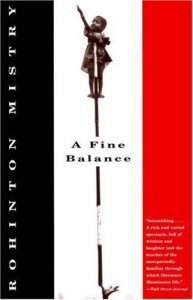Biography
Rohinton Mistry was born in 1952 in Mumbai and is of Parsi descent. He earned a B. A. in Mathematics and Economics at the University of Bombay. In 1975, at the age of 23, he immigrated to Canada where he studied at the University of Toronto and received a B. A. in English and Philosophy. After a few years in Canada, he began to write stories for which he received immediate attention; he won two Hart House literary prizes and Canadian Fiction Magazine‘s annual Contributor’s Prize in 1985. In 1987, he published a collection of short stories entitled Swimming Lessons and Other Stories From Firozsha Baag. He published his first novel, Such a Long Journey, in 1991, for which he received Canada’s Governor General’s Award, the Books in Canada First Novel Award, and the Commonwealth Writer’s Prize for Best Book.

In 1995, he published A Fine Balance, which won the Giller Prize and the Commonwealth Writer’s Prize. A Fine Balance also made the short-list of nominees for the prestigious Booker Prize, and was the basis for a 1998 film of the same title. In 2012 he won the Neustadt International Prize for Literature.
Rohinton Mistry’s Parsi Heritage
The Parsis are a small religious community in India, devoted to Zoroastrianism, whose ancestors fled Islamic persecution in Iran (ancient Persia) during the eighth century. Today only about 125,000 people follow the faith originally propagated by the prophet Zoroaster between 1500 and 600 B. C. The largest Parsi community is in Mumbai but there are also Parsis in Karachi (Pakistan) and Bangalore (Karnataka, India). The population of the Parsi community is diminishing due to its unwillingess to accept conversions to the faith; the Parsis maintain the importance of their purity in the face of high death rates and low birthrates.
The Parsis tended to be on the edge of Hindu society due to their Zoroastrian faith. In terms of the history of British colonialism in India, Parsis were often viewed as agents of and collaborators with the British. Although they enjoyed good relations with the British colonizers, they suffered the stigma of trying to be too Western. The unpopular position of the Parsis at the end of British rule in 1947 influenced another Parsi Diaspora, this time to the West. Mistry’s literature reflects his position as a member of a twice-displaced people, and explores the relationships in the Parsi community in India’s troubled historical context. (See Homi Bhabha-Mimicry, Ambivalence and Hybridity)
Major Themes
Swimming Lessons and Other Stories From Firozsha Baag
Mistry’s short stories describe the characteristics of middle-class Parsi life, and show the characters’ struggles between modernity and tradition. Eleven intersecting stories give portraits of the lives of the members of the fictitious residential block Firozsha Baag. The characters represent Parsis at odds with their religious beliefs and the larger community, and also conveys the common human issues of spiritual questions, alienation, fear of death, family problems, and economic hardships.
Such a Long Journey
Mistry again deals with the Parsi environment in India. He explores the loss of innocence of the protagonist, Gustad Noble, as he attempts to define himself in relation to his family and his country during the chaotic times of 1971 in India, during which India and Pakistan went to war over the liberation of East Pakistan, or Bangladesh (See Partition of India). The novel gives extremely detailed description of the lives of Gustad and his family in their apartment in Bombay, which serves as a contrast to the outside world which disrupts family order. Mistry presents the outside world as a rotten and corrupting force on even the most decent members of the inner sphere.
A Fine Balance
The novel, which is set in India in 1975, during Indira Gandhi’s declared State of Emergency, gives intense descriptions of extreme poverty, and shows the bond that develops between four main characters, despite the barriers created by their differences in religion and social status. Dina, a Parsi woman who refused to return to the home of her domineering brother after the death of her husband, allows two tailors, whose homes have been burned by the government because of their attempts to rise out of the caste of leather workers, to share her apartment. Maneck, a Parsi student who suffers from alienation from his family (who lost their lands in the 1947 Partition), also moves into the apartment. Mistry gives detailed descriptions of the lives of the characters and the hardships they endure (humiliation, torment in a government work-camp, torture, and disillusionment). The novel poses the question of the possibility of the existence of atrocious acts and beliefs in the face of the world’s beauty.
Critical Texts on Rohinton Mistry
- Dodiya, Jaydipsinh, ed. The Fiction Of Rohinton Mistry: Critical Studies. London: Sangam, 1998.
Works Cited
- Dodiya, Jaydipsinh, ed. The Fiction Of Rohinton Mistry: Critical Studies. London: Sangam, 1998.
- Myer, Emily. “Such a Long Journey – Rohinton Misty.” The Brunswickan. >
http://thebruns.ca/> 8 Nov. 2000. No longer available online. - Rahman, Maseeh. “A Race Nearly Finished.” Time South Pacific 16 March 1998. <
http://www.time.com/time/magazine/pacific/0,9263,503120827,00.html> 29 Nov. 2000. No longer available online. - Ross, Robert L. “Seeking and Maintaining Balance: Rohinton Mistry’s Fiction.” World Literature Today Spring 1999. <
http://www.worldliteraturetoday.com/> 29 Nov. 2000. No longer available online. - Ruddy, Martin. “Rohinton Mistry.” National Library of Canada. <
http://www.collectionscanada.gc.ca/lac-bac/results/all-tout.php?FormName=Fed+Simple+Search&SourceQuery=&ResultCount=5&PageNum=1&MaxDocs=-1&SortSpec=score+desc&Language=eng&SearchIn_1=&Operator_1=AND&SearchIn_2=&SearchInText_2=&Operator_2=AND&SearchIn_3=&SearchInText_3=&Sources_1=amicus&Sources_2=mikan&Sources_3=genapp&Sources_4=web&soundex=on&cainInd=&SearchInText_1=rohinton+mistry> 11 Nov. 2000. No longer available online. - Takhar, Jennifer. “Rohinton Mistry, Writer From Elsewhere.” Canadian Literature and Culture in the Postcolonial Literature and Culture Web. <
http://ec2-174-129-30-145.compute-1.amazonaws.com/wp-admin/post.php?post=205&action=edit> 4 Nov. 2000. No longer available online.
Related Sites
More information on the State of Emergency in India in 1975
http://www.mtholyoke.edu/~ghosh20p/
Author: Tom Mitchell, Fall 2000
Last edited: May 2017